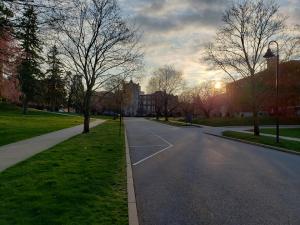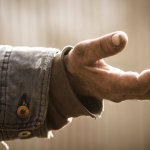Everyone beyond a certain age can remember clearly what they were doing twenty-two years ago today when they heard the news. I was in my college’s main cafeteria getting coffee and noticed something weird happening on the Today Show broadcast on a television hanging from the ceiling in the corner. At that point all they knew was that one of the Twin Towers was on fire, apparently because an airplane had crashed into it. I had scheduled office hours that morning, so I listened to live radio reports on NPR of the second tower being hit and the collapse of both towers. There was a surreal air to the broadcast—I wanted to believe that it wasn’t true, some sort of elaborate hoax along the lines of Orson Welles’ “War of the Worlds” broadcast many decades earlier. But it was true.
Classes were encouraged to meet and decide individually how best to deal with the day’s events. Several students in my first class of the day at 12:30 had family and friends who lived and/or worked in Manhattan—it was clear that the best thing for these students to do was to continue their frantic attempts to contact their loved ones. About half the class stayed and shared their thoughts—what they said and the nature of our conversation is difficult to recall. I know that many students (as well as many of my colleagues) were understandably angry and wanted retribution; as we gathered our things to leave about half way through the class period I said “the one thing I’m feeling is that my best response to what has happened is to become a better person. A better teacher, spouse, father, friend. That’s all I’ve got right now.”
As I was discussing a few of Michel de Montaigne’s later essays with several honors students not long ago, I remembered my immediate response to the events of 9/11, especially that part about becoming a better person. At the end of his essay “Of repentance,” Montaigne writes that
I want to present and show myself uniformly throughout. If I had to live over again, I would live as I have lived. I have neither tears for the past nor fears for the future.
This indicates that, toward the end of his life, Montaigne is comfortable in his own skin in a way that is both admirable and rare.
As my students and I talked, our attention turned to the two years or more of coronavirus disruption that had just passed and how it, having thrown all of us a series of curves that none of us expected, could serve as a catalyst for developing the sort of centeredness that Montaigne describes. Might sheltering in place and physical/social distancing have been a blessing in disguise? What strategies might we practice now that will make us better people as we slowly emerge from our sheltered caves?
The theme of “what if I got to live my life over again?” raised by Montaigne is developed, three centuries later, by Friedrich Nietzsche into a disturbing and challenging thought experiment. In The Joyful Wisdom, Nietzsche asks
What, if some day or night, a demon were to steal after you into your loneliest loneliness and say to you: “This life, as you now live it and have lived it, you will have to live once more and innumerable times more; and there will be nothing new in it, but every pain and every joy and every thought and sigh… must return to you—all in the same succession and sequence” . . . Would you not throw yourself down and gnash your teeth and curse the demon who spoke thus?
I suspect—and Nietzsche expects—that most of us would have precisely that reaction. That poor choice, those intemperate remarks, these losses, griefs, and times of suffering, isolation away from those we miss and love, perhaps out of a job and worrying about the future over and over and over (and over) again and again? Nothing could be worse!
But as he continues, Nietzsche turns the tables on the reader.
Or have you once experienced a tremendous moment when you would have answered him: “You are a god, and never have I heard anything more divine!” . . . The question in each and every thing, “do you want this once more and innumerable times more?” would lie upon your actions as the greatest weight. How well disposed would you have to become to yourself and to life to crave nothing more fervently than this ultimate eternal confirmation and seal?
Whether Nietzsche believed that this thought experiment, which he called “eternal recurrence,” was something that we all would actually experience is a continuing matter for debate among Nietzsche scholars. Its value, however, as both a psychological and a moral tool is undeniable. Live your life as if you will have to repeat every bit of it over and over again. How differently would I live my life from day to day, moment to moment, if I knew that I would have to repeat every detail of it—down to the minutest choice and action—over and over again for eternity?
Because I live only a half mile from the college campus where I have taught happily and successfully for the past thirty years, and because our campus is one of the most beautiful I have ever seen, I frequently find myself headed there on daily walks. Campus was virtually empty during the worst of the pandemic, and that threatened to be a serious downer. Especially during the days when all classes were remote, there were plenty of reasons to be stressed and negative.

But one morning during April 2020 as the sun rose over one of our signature contemporary Gothic buildings, beauty surrounded me. Flowers and leaves were coming out, the birds were singing in every tree, and peace infused the air. The annual spring return of life overwhelmed me—as if nature didn’t care if I, or we, were living lives of serious disruption. There’s nothing better than nature doing its thing to put our human concerns into perspective. Maybe, just maybe, we actually aren’t the center of the universe after all.

I chose to breathe that peace in rather than choose frustration at teaching opportunities lost because of circumstances beyond my control. Remembering what Jesus said about lilies dressed more beautifully than Solomon, sparrows noticed by God, and letting each day’s worries be sufficient instead of focusing on what might happen tomorrow, helps to sustain such choices. None of us can control much, but we can entirely choose how to be in the middle of even the most challenging circumstances. And maybe that’s the key, at least for me, to becoming a better person.
In his letter to the Philippians, a letter than one commentator describes as “the epistle of joy and encouragement in the midst of adverse circumstance,” Paul writes that
I have learned in whatever state I am, to be content. I know how to be abased, and I know how to abound. Everywhere, and in all things, I have learned both to be full and to be hungry, both to abound and to suffer need.
It’s worth remembering that Paul writes this from a prison cell. It is clear from his letters that Paul is fully human, through and through, with feet of clay up to his eyeballs just as we all have. But in the midst of stress, pressure, and loss of his freedom, Paul has learned “to be content.” That’s a very heavy lift, but there’s nothing particularly magical or even “holy” about it. The capacity to choose peace, centeredness, beauty, and goodness over stress, distraction, negativity, and strife is within each of us. The more we make those choices, the better we become.













